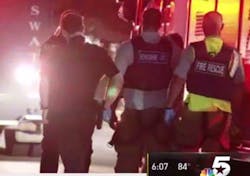Body Armor Issue Surfaces after Dallas EMT Shooting
May 2--Dallas Fire Chief David Coatney said during a Monday press conference that the Dallas Fire-Rescue paramedic who was shot while responding to a call was not wearing body armor and didn't have a vest with him in his vehicle.
An NBC 5 investigative report last summer revealed that Dallas Fire-Rescue was stepping up efforts to give more paramedics and EMTs access to bulletproof vests after a deadly ambush attack last July that left five Dallas police officers dead and wounded nine others.
The chaotic scene from that horrific day raised concerns about the safety of paramedics trying to aid the wounded during an active shooting, but NBC 5 has learned that those bulletproof vests are only given to Dallas paramedics in limited situations.
Since that shooting, Dallas Fire-Rescue has given medics access to about two dozen body armor kits for active shooter situations in coordination with police, according to NBC 5.
"And we don't carry the body armor on the actual rescue units. They are contained in the other response vehicles that come to the scenes," Chief Coatney said.
Some cities have mandatory requirements for medical response personnel to wear body armor, including Cleveland, which enacted the measure in December 2015.
"(Cleveland paramedics) are trained to look for scene safety to make sure they're safe before they even go in, but things can happen in a moment's notice and I want to make sure that they're safe," Cleveland EMS Commissioner Nicole Carlton told The Plain-Dealer at the time.
But some fire and EMS officials across the country worry that wearing body armor might cause medics to take unnecessary risks going into danger areas instead of waiting for police to arrive.
At Monday's press conference, Chief Coatney said his department will continue looking at their body armor policy following Monday morning's incident.
Another ongoing debate in Texas surrounds proposed legislation that would give firearms to certain first responders. The Texas Senate in April endorsed a bill that would permit paramedics and other first responders, including volunteer firefighters, to carry concealed handguns in restricted areas.
Some first responders have said they need guns, especially in rural areas where police have longer response times, but officials worry that armed EMTs might become too involved in police work instead of caring for the injured.
